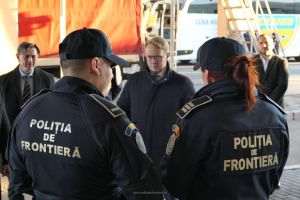Calling the Greeks "lazy", is a situation similar to the one in the joke about Soviet sailors who had become ship wrecked on an island and would rape the female cook all night, and in the morning they would write her up for being a whore.
Today, next to Greece's name, the debt clock displays 348 billion Euros, (but "the working figure" for the press is 330 billion); in the end of 2011, prior to the "bailout", government debt was 162% of the GDP, and it now amounts to 180%; Greece's economy is 20% than the estimates of the IMF in 2010, when the "European unification process began".
Since then, the IMF, the EU and the ECB have loaned Greece 252 billion Euros (the remaining amount was granted by "various", or by very shrewd speculators), amount which was used as follows:
- 34.5 billion, to "assuage" the private sector, in order to accept the restructuring of the debt, in 2012;
- 48.2 billion, to support the banks in Greece;
- 149.2 billion, to pay off the initial debts.
But the banks in Greece aren't Greek.
That means that only 20 billion (if that) will have been used to actually support Greece's economy, in other words less than 9% of the money borrowed from the "Troika".
Until the Syriza won the elections, there was a chasm between the Greek people and its government- it is a country cannibalized by corruption (like it is in Romania), and fiscal discipline has been perceived as encouraging the state's theft.
Furthermore, what's the point of working, when the debt is growing?!
If Greek industriousness doesn't matter, then what sense does it make to call the Greeks "lazy"?!
Greek banks are mostly owned by foreign investors (if we consider as "state owned foreign investor" the "Hellenic Financial Stability Fund", based on the EFSF, which spent 50 billion Euros in 2010, on recapitalizing the Greek banks).
Among them, the group of the largest investment funds in the world stands out (about whom no one could say that they didn't pay attention when they bought stocks in the Greek banks, like it's being said about the Romanians who took out loans denominated in CHF).
For instance, in the case of Alpha Bank, the second largest investor is Paulson & Co., Inc., owned by John Alfred Paulson, a living legend, notorious for his billion dollar fortune, made in 2007, by speculating on the CDS (insurance policies against default, which can make their holder to want the default of the company they own stock in, so they can make huge profits).
Between 2012 and today, the foreign and Greek banks and financial entities that had lent money to the Greek government have recouped their investments and have disappeared from the list of potential losers; they included French, Germans, Italians and Greeks.
It was them that the European quantitative easing program was intended to save.
That program represents nothing more than the seizure of wealth from the European peoples.
Issuing Euros cost the central European financial and banking institutions nothing.
Or almost nothing: the money wasn't even printed, which would then entail the cost of the paper, the electricity and the wages of the printing workers; or not, it was just an hour's wage for an accountant and the electricity for their computer.
Under these circumstances, I don't see why the European Union wouldn't give Greece one trillion dollars for free.
And it could give us one as well.
Perhaps one to each of us.
At any rate, the goal seems to be to make the Euro worthless...






























































